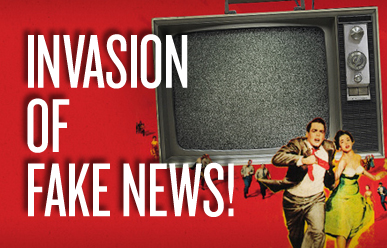The Information Literacy of Fake News

Pre- and post-election last fall, there were many stories in all types of media about "fake news." An article in The Chronicle asks "How Can Students Be Taught to Detect Fake News and Dubious Claims?" but I would say that non-students need even more education in this area. Of course, the real question is whether or not this is a teachable skill.
If you had asked me last January to define "fake news" I would have said it was a kind of satire or parody of mainstream journalism. The Onion online, or Saturday Night Live's news segment would fit that definition. Satire always has a bit of truth in it or it doesn't really work.
The Daily Show and Last Week Tonight with John Oliver and other shows and sites have blurred the line. They use real news and sometimes parody it, but sometimes they are closer to investigative journalism. They can edit together clips of a persons inconsistencies in views over the years and create a montage that shows someone who either has a terrible memory or is a liar. It may frighten some to hear it, but many young people and adults list shows like these as their main source for news.
The fake news that is really the focus of attention now are ones (almost exclusively online) that produce wholly fictionalized news stories. Those non-journalistic entities have a very powerful delivery system via social media like Facebook and twitter.
A Stanford University report published last year concluded that many students could not detect fake or misleading information online. They gave students from middle school to college tasks to see how well they could tell a native advertisement from a news article or identify a partisan website as biased or separate a verified social-media account from an unauthenticated one
A larger conclusion I see here is that faculty often assume that young people are fluent in or savvy about n social media in the same way that it is assumed that digital natives know how to use smartphones, websites, photos, video and other digital technology. Bad assumption or expectation.
I remember teaching lessons on determining the veracity of research sources before there was an Internet and after. That has been a part of literacy education since the time when books became more common. I'm sure it was a teachable moment pre-print when a parent told a child to ignore gossip and stories from certain people/courses.
The Stanford researchers said that we need to teach "civic online reasoning" which is something that goes beyond its need in academic settings.
In whose purview is this teaching? English teachers? Librarians? I would say it would only be effective if, like writing in the disciplines, it is taught by all teachers with a concentration on how it occurs in their field.
The science instructor needs to teach how to determine when science is not science. An easy task? No. Look at teaching the truth of climate science or evolution. It is controversial even if the science seems clear.
Napoleon Bonaparte is credited with saying that "History is a set of lies agreed upon." If that is true, how do we teach the truth about history past and the history that is unfolding before our eyes?
But we can't just say it's impossible to teach or assume someone else will take care of it. Information literacy is still a critical, difficult and overlooked set of skills to teach.
Trackbacks
Trackback specific URI for this entryThe author does not allow comments to this entry
Comments
No comments